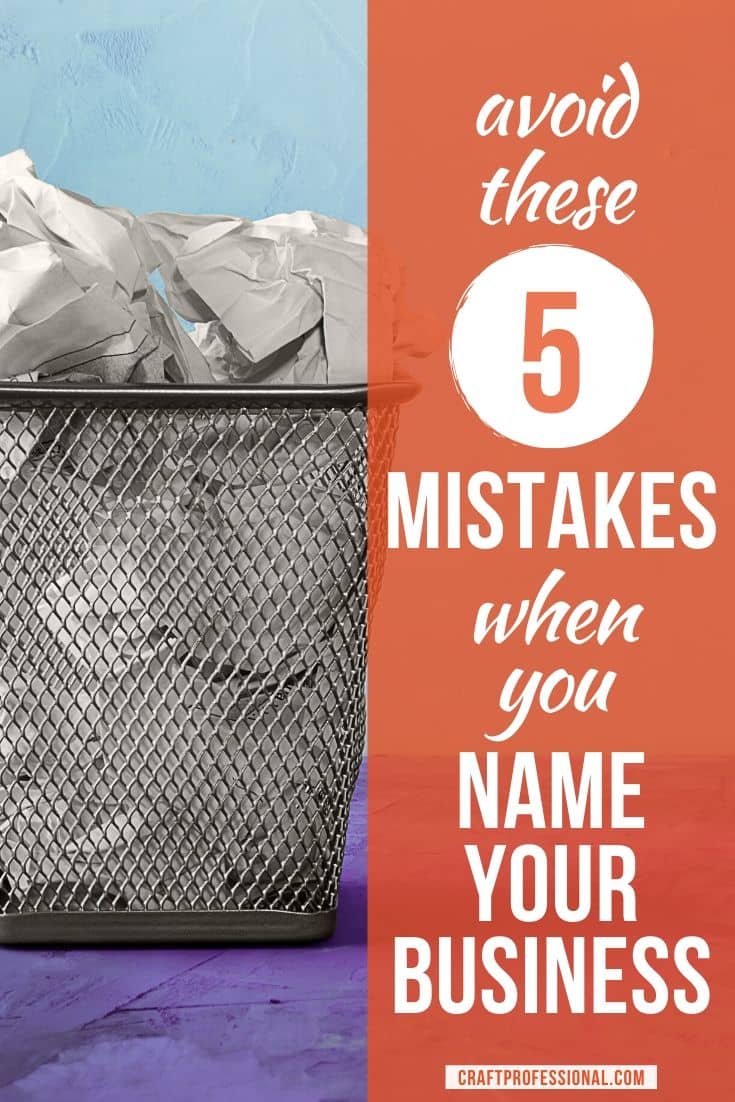Bad Company Names
Bad company names share a few characteristics. Find out what the worst business names have in common, so you can avoid making the same mistakes yourself when you name your company.
What Do Bad Company Names Have in Common?
The worst company names are:
- Completely meaningless to customers or send an unfortunate, unintended meaning
- Complicated by "creative" spelling or unclear pronunciation
- Unoriginal; derivative of another popular business name or super-trendy
- Boring and fail to grab your attention
- Specific in a way that limits future growth and changes in the business
Let's look at each of these unfortunate business naming mistakes in some detail.
1. Completely Meaningless or Sends an Unfortunate, Unintended Meaning
Be cautious about using an invented word to name your company.
Made up words may be meaningless to your customers, and you definitely want your company name to convey some meaning.
A completely made up word that's just a random jumble of letters will be empty of meaning to customers. They won't be able to connect it to anything they already know, so it will be forgettable.
You'll constantly have to explain and spell the name, and people might not know how to pronounce it.
You may be thinking, What's the big deal with using an invented word as a company name? You can probably think of a few companies that have completely made up names, and they sound perfectly fine to you.
I earn a commission for purchases made through links on this page.
To learn more, please see my disclosure.
Here's the difference between those companies and your company:
Alexandra Watkins, business naming expert and author of Hello, My Name is Awesome , says you recognize those made up names, "because the company has drilled it into your head by spending millions of dollars in TV advertising."
Do you have millions of dollars to spend on advertising? Probably not, so don't choose a name that will hamper your marketing efforts.
Made up words can work, but you need to be careful. There are a lot of pitfalls, and it's easy for this type of business name to go very wrong.
If you'd like to try creating an invented word for your business name, read more about how to create a catchy company name to learn about different types of invented names.
Check out what the kids are saying.
Before you commit to a business name, make sure it doesn’t carry any unfortunate, unintended meaning. You may feel a word or phrase communicates the perfect message about your business, but that word may mean something entirely different to others.
Trust me, I have a teenager, and although we live in the same house, in the same town, sometimes I'm convinced we speak two completely different languages. When my kid texts me, I often have to visit the Urban Dictionary to translate.
Don't get stuck with a bad company name that has an unfortunate slang meaning. Check the meaning with a few sources before you commit.
Does your business name translate well?
Be wary of company names that carry an unsuitable meaning in another language, particularly if you may do business internationally. Check translations before you commit to a name.
When you check translations of potential names, be a bit careful with online translation tools. They don't always pick up subtleties in language.
We speak English in my home, but my kids are learning French at school. They love to point out ridiculous English to French translations on Google translate, which they find hilarious.
My French is passable, but it's not good enough to understand the problems my kids can see with online translation tools. You need a good level proficiency in a language to understand important subtleties.
You don't necessarily need to translate your potential business name into every possible language. However, do think about where you might realistically do business, and what language(s) your target customers might speak. Make sure your business name is acceptable in those languages.
If possible, consider asking a native speaker of the language you want to check for their input.
Related: Tools for checking slang meanings and translations of business names.
2. Complicated by "Creative" Spelling or Unclear Pronunciation
Why creative spelling leads to bad company names.
Choosing a business name that uses "creative" spelling - that is, words that are purposely spelled wrong - might get you a cheap domain name for your business. But it will also almost certainly be the source of all kinds of confusion, frustration and regret.
I know it's a big challenge to find a name that's not already in use and has an available domain name. But if you resort to creative spelling to find a unique name, you'll have to constantly spell it out any time you need to communicate your business name to someone.
It is possible to get a good blog name without resorting to bad spelling. It just takes a little more work and creativity.
Sadly, I have first-hand experience with this type of business naming fail. I used to have one of those tough to spell business names. It was painfully embarrassing to explain every time someone asked about my company.
Also, if your business name uses creative spelling, you may reduce the chance of being found by interested customers. If people don't know how to spell your name they will guess the correct spelling - not your creative spelling - when they go searching for your company.
Good business names are simple. Don't over-think things with fancy spelling.
The problem with unpronounceable names.
Hard to pronounce business names carry a lot of the same problems as creatively spelled names. You'll have to constantly explain how to say your business name. It may become annoying to you, and the ambiguity of the name might put customers off.
Whether your business name is a real or invented word, it needs to be simple and intuitive to spell and pronounce.
Favorite Business Naming Resources
Hello, My Name is Awesome by Alexandra Watkins
Brand New Name by Jeremy Miller3. Unoriginal; Derivative of Another Popular Business Name or Trendy
Derivative company names are bad company names.
What's a "derivative" business name?
Derivative in this context refers to something that has been copied from another source. It may have been changed slightly, but it hasn't been changed enough to be fresh and different from the original source of inspiration.
So a derivative business name is one that is a clear copy of another company's name even if it is slightly changed.
It's easy to get drawn into the allure of someone else's perfect business name. You come across a name that is everything you want your business name to be.
It's perfect.
You can't get it out of your mind, and you wish you had thought of it first.
You start brainstorming names "inspired by" your competitor's fabulous name. And before you know it, you find yourself trying to justify using a derivative business name that's a clear copy of someone else's name.
Don't do it!
A derivative business name can open up a pile of problems
If you use a derivate business name, you won't be establishing your own, unique brand identity. If customers know the other business, they will always think of that business when they hear your name. You want customers to think of you and you only when they hear your company name.
You could also open yourself up to problems with trademark infringement. If your name is too similar to another company's name, the other company may take action, and you could be required to change your business name. A business name change can be done, but it's a lot of work and is best avoided.
I'm not a lawyer, so don't take legal advice from me!
You should always check your business name with an attorney before committing to a name. But even before you get legal advice, while you're still in the brainstorming phase, know that derivative business names can be fraught with problems and should be avoided.
You don't make derivative art, so don't use a derivative business name.
Be wary of naming trends.
Trendy names can seem like a great idea at the time.
A name style that you hear everywhere, that sounds perfectly stylish in the moment, can sound completely dated in a few short years.
If all the cool kids are using a certain naming style, you might think using that style yourself will put your business in league with the cool kids.
For example, the "name + name" branding trend - think Elizabeth and James, or Lark & Ro - lends itself to some beautiful sounding business names. But I wonder how well those business names will stand up over time. Will those companies seem terribly dated in a few years?
You want your business to last and always feel fresh to customers. In 2030, you don't want a business name that feels so 2020.
Take it from a girl named Lisa.
My first name was wildly popular through the 60s and early 70s, when I was born. There were always two or three Lisas in my class at school. In the early 70s, if your name wasn't Lisa, it was probably Jennifer.
Today, nobody names their child Lisa or Jennifer. You're not going to meet many 20-year-olds with either of those names.
While having a personal name that shows your age isn't a big problem, you don't want a business name that seems dated. Your business should always feel current, and a trendy name can quickly make your business feel antiquated.
4. Boring and Fails to Grab Attention
Good business names give some insight into what your company is all about, but you don't have to stick to straightforward, descriptive names.
Look for a name that provides opportunity for fun. Good business names evoke visual imagery, are full of potential to expand upon a theme, and can be creatively extended into other elements of your branding.
5. Specific in a Way That Limits Future Growth
While you want your company name to convey some meaning about the nature of your business, you shouldn't get so specific that you're stuck with a name that limits your future growth.
Businesses evolve over time. New opportunities arise, and you discover and grow what works and drop what doesn't work.
It can be tough when you're launching your business to know where it might go over the next several years. But do try to picture where your business might be in the future, and try to leave room for that kind of growth in your company name.
Related: How to Name a Business



New! Comments
Have your say about what you just read! Leave me a comment in the box below.